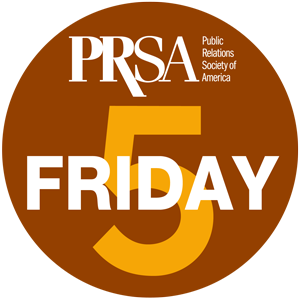It’s a scenario that keeps public relations and social media professionals up at night…you plan a campaign on behalf of your company or client, outline your strategy, goals and expectations, somewhere in the back of your mind, you have a notion of what your followers will contribute so you launch what you hope to be a “viral” hashtag. Within minutes, you realize something has gone terribly wrong and you have no way to stop the wave of negativity.
 In this week’s Friday Five – an analysis of the week’s biggest public relations and business news and commentary – we’ll examine what happens when hashtags trend for the wrong reasons. We will take a look at the backlash against Dr. Mehmet Oz, how #AlexFromTarget is doing after being thrust into fame, a hijacked Bill Cosby meme generator and an ill-conceived tweet from Nestle. We’ll also share some phrases that every social media manager dreads hearing.
In this week’s Friday Five – an analysis of the week’s biggest public relations and business news and commentary – we’ll examine what happens when hashtags trend for the wrong reasons. We will take a look at the backlash against Dr. Mehmet Oz, how #AlexFromTarget is doing after being thrust into fame, a hijacked Bill Cosby meme generator and an ill-conceived tweet from Nestle. We’ll also share some phrases that every social media manager dreads hearing.
Here’s what happened when Dr. Oz asked Twitter for health questions (Vox.com)
“America’s Doctor” Dr. Mehmet Oz probably didn’t expect brutal backlash when he asked for medical questions on Twitter using the hashtag #OzsInbox, but the response was swift and ruthless. Vox.com’s Julia Belluz explains: “But since Oz made his offer (Tuesday), the #OzsInbox hashtag has turned into a channel for rage and shame, where skeptics and disappointed viewers have been venting about Dr. Oz’s pseudoscience and trickery.”
Here’s just one example of the kind of response to Dr. Oz’s seemingly harmless offer:
.@DrOz “First do no harm”. Does promoting quack cure-alls and diets, while trashing good medicine and technology do harm? #OzsInbox
— Kevin Folta (@kevinfolta) November 12, 2014
Do you have any thoughts on how Dr. Oz could have avoided such a polarizing hashtag mistake? Share your thoughts in the comments below after reading the full story on Vox.com.
Alex From Target: The Other Side of Fame (The New York Times)
Alex from Target is a 16-year-old that neither asked (we think, anyway) for his picture to be taken nor posted on Twitter. Nonetheless, he was forced into “stardom” for simply doing his job. Over the course of a few days, he went from 144 Twitter followers to more than 730,000. Now he told New York Times reporter Nick Bilton, “I’m kind of scared to go in public.”
Alex’s father explained to Bilton what the family has been dealing with: “Mr. Fooks said that in addition to death threats, people have leaked the family’s personal information online, including Social Security numbers, bank accounts and phone records. The family, worried for the safety of Alex and his five siblings, has been in contact with the local police. Alex’s parents have met with his school’s principal and security officers, as well as Target managers, to put together security plans in case of an emergency.”
What ethical guidelines do you follow before posting to social media? Read more about Alex’s plight via the full article.
Bill Cosby axes meme generator after focus on sex assault allegations (Los Angeles Times)
When Bill Cosby’s social media team invited followers to create memes on his website, they most likely thought that they would receive some cute messages about “Jello pudding” or funny photos with some of Cosby’s quirky sayings. What they obviously didn’t conceive was social media users tying the memes to Cosby’s alleged sexual assault.
Even though the social media team had a plan in place to pre-approve the memes that were posted to the website, they did not think the generator all the way through. Los Angeles Times reporter Ryan Parker explained: “Shortly after the challenge went out, the #CosbyMeme hashtag had been taken over by unflattering images of the comic. The reason for the meme generator was unclear, and although submissions were subject to review before they were posted on Cosby’s site, there was little to prevent people from sharing their unapproved creations off the site.”
What did you think of the meme generator idea? Read the full article via the Los Angeles Times.
Nestle apologises after tweeting that missing Mexican students were ‘Crunched’ (The Telegraph)
If there’s a tragedy that’s gripping a country, it’s probably not a good idea to write a “cute” tweet with the intent of promoting your product. After the disappearance and probable murder of 43 teachers-in-training in Mexico, a tweet published by Nestle’s Crunch brand was posted saying, “A los de Ayotzinapa les dieron Crunch” – a pun on a slang Mexican expression, which translates as: “They crushed those from Ayotzinapa” according to reporter Harriet Alexander.
The company said the tweet was “unauthorized” and that it goes against the company’s values. What kind of system should Nestle implement to make sure this doesn’t happen again? Sound off in the comment section below after you read the full article.
5 phrases social media managers never want to hear (Ragan’s PR Daily)
As we have seen so far, it probably isn’t a good idea to simply tell a social media manager to make something “go viral.” While many are using social media for personal purposes, many still do not understand how to properly use the platforms for brand communication purposes. PR Daily contributor Lauren Marinigh shares a few phrases that social media managers never want to hear, but frequently do. Other than the aforementioned “make it go viral” below are a few of her picks:
- ‘What do you do all day?’
- ‘What happens when social media isn’t ‘a thing’ anymore?’
- ‘I don’t see the point of social media.’
To view the full list, visit Ragan’s PR Daily.
Rosanne Mottola is public relations manager of the Public Relations Society of America.






